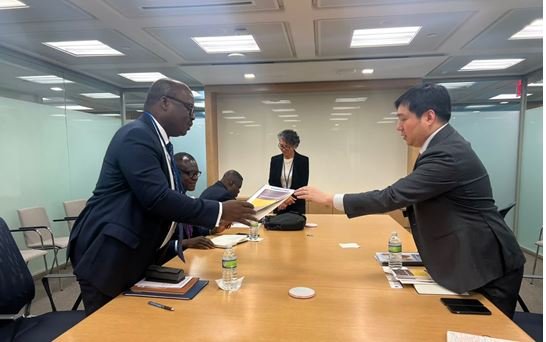The Bank of Ghana (BoG) has announced plans to inject USD 1.15 billion into the foreign exchange (FX) market this month in an aggressive bid to stabilize the local currency and smooth volatility in the interbank market.
The intervention, which forms part of the Domestic Gold Purchase Programme, will be conducted through twice-weekly, price-competitive spot auctions open to all licensed banks.
Governor Dr. Johnson Pandit Asiama, speaking at a post-Monetary Policy Committee engagement with banking executives, emphasized that the Central Bank’s overarching objective was to deepen the interbank FX market and enhance price discovery.
“Monthly auction volumes may be adjusted depending on evolving market conditions, but our overarching objective remains clear: to deepen the interbank FX market, enhance price discovery, and smooth volatility,” Dr. Asiama said. He added that all transactions would be transparent, with no conditions or earmarking to ensure a level playing field for market participants.
The decision comes at a critical time when the Ghanaian cedi has been under renewed depreciation pressure, driven by strong corporate demand for dollars and a decline in foreign reserves. The BoG hopes the injection will bolster market confidence and provide short-term relief to the struggling currency.
However, this latest move pushes the Central Bank’s total foreign exchange intervention for 2025 to USD 4.55 billion, following injections of USD 1.4 billion in Q1 and over USD 2 billion in Q2. Analysts warn that such levels of intervention, though supportive in the short term, could pose risks to Ghana’s long-term reserve adequacy.
IMF and World Bank Raise Red Flags
The move has not gone down well with Ghana’s key international partners — the International Monetary Fund (IMF) and the World Bank. Both institutions have repeatedly advised the BoG to avoid excessive forex interventions, stressing that the local currency should be allowed to adjust through market forces of demand and supply.
According to the Institute of Political Studies (IPS-Ghana), this latest announcement “sets the BoG on a direct collision course” with the IMF and World Bank, who have warned that large-scale forex market interventions are unsustainable and counterproductive.
“The IMF and World Bank have consistently argued that these interventions distort the market, reduce transparency, and weaken economic resilience,” the Institute noted in an assessment released after the announcement.
Reserves Depleting Despite Earlier Gains
While the BoG has touted significant progress in reserve accumulation between March 2024 and June 2025, recent figures tell a different story. Ghana’s gross international reserves declined from USD 11.1 billion in June 2025 to USD 10.7 billion in September 2025 — the first drop in 15 months.
This decline has also reduced the import cover ratio from 4.8 months to 4.5 months, raising fresh concerns about Ghana’s external vulnerability. Analysts say the fall in reserves underscores the unsustainable pace of the Central Bank’s interventions, which are rapidly depleting the country’s foreign exchange buffers.
“The continuous and excessive forex market interventions threaten to reverse the hard-won gains in reserve accumulation. They risk undermining investor confidence and weakening the country’s economic resilience.”
IPS-Ghana
Despite the criticism, the BoG maintains that its actions are justified and aimed at stabilizing market expectations. Dr. Asiama reaffirmed the Central Bank’s commitment to transparency and responsible FX management, stressing that all operations would be made public in line with international best practices.
He also praised the banking sector’s performance, noting improvements in key financial indicators.
“The Capital Adequacy Ratio has risen to 17.7 percent, while Non-Performing Loans have declined to 20.8 percent — though still elevated and requiring sustained vigilance.”
Dr. Asiama
To further strengthen the industry’s stability, the BoG has introduced several new prudential measures, including the Bancassurance Directive, the Large Exposures Directive, and the Guidelines on Credit Concentration Risk Management. Additionally, the transition period for the Outsourcing Directive has been extended to December 2025, marking what Dr. Asiama described as the “final extension.”
Experts Recommend a Shift in Strategy
Economic observers believe the BoG must rebalance its approach. They argue that while short-term interventions may ease pressure on the cedi, sustainable forex stability requires building robust reserves, structural reforms, and real sector growth.
“Adequate reserve buffers are especially crucial in today’s uncertain global environment,” IPS-Ghana noted. “Healthy reserves can help an economy recover more quickly from shocks and limit the impact of short-term exchange rate volatility.”
The Institute urged the BoG to prioritize reserve accumulation, undertake structural reforms, and promote investment in the productive sectors of the economy. These measures, it said, would enhance Ghana’s long-term economic resilience and ensure a more sustainable exchange rate framework.
As the BoG proceeds with its USD 1.15 billion injection, the balance between stabilizing the cedi and preserving reserves remains delicate. The Central Bank faces the dual challenge of restoring currency stability while maintaining credibility with international partners.
Experts caution that if the BoG’s interventions fail to achieve lasting stability, Ghana could face renewed external vulnerabilities and reduced investor confidence.
Ultimately, the path forward lies in transparent policymaking, prudent reserve management, and deeper structural reforms — steps that could help Ghana strike the right balance between immediate stabilization and long-term economic sustainability.
READ ALSO: Rising Gold Prices Power Ghana’s GoldBod Economic Strategy



















